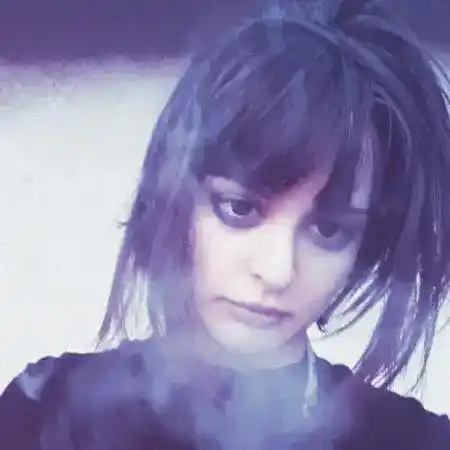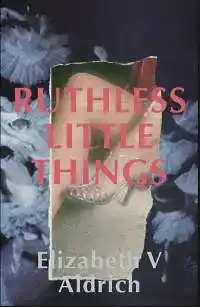Last month, the literary village suffered, and continues to mourn, the immeasurable loss of firebrand author Elizabeth V. Aldrich, known to the community as Eris; as Lizzie to her closer circle and father, James Allnutt. She would be thirty years old this fall.
Lizzie’s prolific output, found primarily at online transgressive venues, would help coin and further define the term “cyberwriting” – a phrase that began as tongue-in-cheek before it would represent a generation of outsider writers who began wielding it with absolute sincerity; many who saw Lizzie as the infernal head of this fierce cultural comet.
In late 2020, Expat Press released her debut novel Ruthless Little Things, an accumulative declaration of her euphoric glitter-littering confessionals that would bring a distinctly modern experimental style to the at-risk youth diary form. Her amoral wind-tunnel prose could transfuse a wide-eyed ecstasy into the reader’s consciousness; disarming as it could be empowering or dangerous. Beyond its unanimous underground acclaim, RLT proved scholarly in 2021, when David Vichnar would include it in his syllabus at Charles University in Prague.
Off the page, she was bravely outspoken regarding her long-time BPD diagnosis, and as a result, Lizzie often de-stigmatized the maligned and misunderstood disorder of our times. Her irreverent humor, deep-sighing kindness, and un-jaded enthusiasm would stand in sincere defiance of similar stereotypes others appear doomed to. There was no one else like her.
When free from her tireless maternity to hungry ghosts and subsequent debts to society, Lizzie’s Friday nights were spent with near-religious commitment at Misery Loves Company online reading series, an adopted family to her and many others who forge a unique bond through the intimacy of outsider prose and poetry; then during the off-camera after-hours where anything went. On July 15th, the reading series would become a memorial for Lizzie, a night that would host its largest turnout to date; writers and readers from all over the world (let’s be honest: it was 90% broken hearted men), sharing stories and sentiment in her tribute for over four hours.
It would have been easy to keep going if it wasn’t so fucking hard.
See you later, little sister,
E.V.A. FOREVER.
Her body of work is archived here.

—
“No one captured the raw eschatological ecstasy of the era like her. No one. She was as rapturous as she was damaged. Lived by seconds.”
–Manuel Marrero, founder of Expat Press/author of Not Yet
—
"I don't need to say how good Lizzie's writing was; it's out there, living on, and its irrefutable power speaks for itself. She was so much more than her writing. She was a renegade light that burned in cheerful opposition to her own darkness. She never made any apologies, and she never demanded any, either. She was one of very few people around whom I felt comfortable enough to really be myself, largely because she was so forthrightly herself. She never measured her words. She had an airy, lighthearted weightlessness, seemingly unencumbered by self consciousness. It was infectious. More than that, she had a way of celebrating you, of making you feel like you could shed petty hang-ups and anxieties as if you were shrugging off that extra layer of clothing you thought you needed to guard against an imagined cold; her warmth made you realize you never needed it in the first place. I've rarely felt as content and serene as I did in quiet moments spent with her. Los Angeles feels desolate and empty without her."
–Chandler Morrison, author of #thighgap
—
“Eris was one of the first writers I found through the scene, so through her I found there was a whole community writing transgressive and out there writing. That was one of the happiest days of my life —seeing this queer girl who was like Bret Easton Ellis for the Trump-era was so fucking exciting and it validated everything.”
–Alexandrine Ogundimu, author of Agitation
—
“Lizzie’s loss is a deep wound not only for those who knew her, but for literature in general. However, her legacy is now firmly cemented. Decades from now, we’ll still be feeling the influence of Ruthless Little Things in writers who will come after her. Beyond her writing talent, Lizzie was unfailingly selfless in promoting other writers and commenting on their work. Despite the troubles she faced, she never lost her sense of wonder and curiosity. She had a genuine interest in people’s lives and tried to learn all she could from them. I’ll remember her as one of the finest writers I’ve worked with, and a close friend who had an immensely positive impact on my life.”
–Matt Forney, founder/Editor in Chief of Terror House Press
—
“I don’t know how to talk about her yet, or to who. It feels obscene and inappropriate. I type a thought and delete it. She was central to everyone and everything. Her presence had many meanings, all of them burning, sometimes all at once. I think it’s some kind of cosmic joke that she, who wrote her fucking ass off and absolutely devoured literature and writers, would leave so many of us without words.”
–Derek Maine, author of Characters
—
She knew that it's only real when the stakes are real. The things her spirit made possible will live forever.
“She was a diamond in the rough. Eris existed in a separate circle than I, but she showed me kindness by acknowledging me as a fellow human being. She held no judgments on people’s appearance or material, and her writing came from the heart."
–Courtenay Schembri Gray, assistant editor at A Thin Slice of Anxiety, writer/poet
—
“Eris was a true outsider artist in a world where most people just wear the costume. She was a real outlaw, always pushing the envelope. Yet, she always seemed to give everyone the time of day and would be just so enthused to support everybody. She didn’t seem bitter or misanthropic as you might expect with someone in her shoes.”
–Jesse Hilson, author of Blood Trip/founder of Prism Thread Books
—
"It wouldn't be right to say that Eris had no filter. Her insightful commentary that seemed to laser target endorphins was testament enough to that, as was her constantly changing Snapchat background in calls. What she lacked was a barrier, a retaining wall for her uncontainable outpourings of positivity, and the absence of that—the complete honesty and lack of pretense in her musings—brought so many people close to her. She was a smasher of personal creative gates, of imposter syndrome feelings, of stasis."
–Rudy, editor at Misery Tourism
—
“I first met Lizzy in my inbox. Someone she loved had recently died, and she had just read my first book and she wanted to connect and talk about death and love. She knew how to really communicate online. She was honest and real from the get-go, even when she might have been playing with persona. She had such a sharp, wild mind. One of the last times we chatted, I told her I loved Ruthless Little Things and that I was sending a copy to a friend overseas. I admitted that I was scared to release my next book and she sent a perfectly Eris response: "<3 scared means it's gonna be EPIC." I think she knew that it's only real when the stakes are real. The things her spirit made possible will live forever.”
–Lindsay Lerman, author of What Are You
—
“Even now, weeks after hearing that Eris passed, I do not know what to say. I have no words. I don't know how to rationalize or contextualize or even simply express the magnitude of this loss. I just saw a tweet about a gargantuan hole in space: a massive formless void where, by all reason, there should be so much substance, so much light. It's a crass, obvious metaphor, unworthy of her, but when everything is dark, you have to use whatever your hands can grasp, sightless. At her memorial, I saw authors who cannot stand each other, who hate each other because of politics or personalities, because of the principled narcissism that all creatives (except her) seem to share, cry together, united, briefly, in grief. Her talent, her compassion, her generosity, her enthusiasm, and her light penetrated and transcended all arbitrary borders and boundaries, annihilated all pettiness, all bullshit. Every artist who met her saw her and loved her; every artist who met her felt seen and loved. I don't see how our literary universe can survive her absence."
–William Duryea, editor at Misery Tourism, host at Misery Loves Company
—
 “When I began writing this, I couldn’t decide whether to talk about Lizzie’s book/writing or her emails/IG messages/texts. Then I realized they were all the same thing. They were all Lizzie and Lizzie couldn’t write a bad or boring sentence or phrase. Everything she said, typed, wrote fascinated me in the way everything Courtney Love sang, bantered about on stage, said in interviews, yelled at Madonna or Axl Rose on MTV in the early 90s fascinated me. That’s just how it was from the first time I read anything by Lizzie. I think it was her book, Ruthless Little Things, I read first. I ordered a copy, and as soon as I read it I ordered 9 or 10 more to give to all my coolest girlfriends. “You have to read this fucking book!” I told them. I hate to type cliché shit like “her book was alive in a way other books weren’t!” but that’s how I felt about it, about her. Raw. Unfiltered. Unstylized. Unedited. Balls to the wall. Punk rock lead singer screaming. That’s how it felt reading it. Like reading long messages in black marker on bathroom stall walls. Unhinged. Mad. Relatable."
“When I began writing this, I couldn’t decide whether to talk about Lizzie’s book/writing or her emails/IG messages/texts. Then I realized they were all the same thing. They were all Lizzie and Lizzie couldn’t write a bad or boring sentence or phrase. Everything she said, typed, wrote fascinated me in the way everything Courtney Love sang, bantered about on stage, said in interviews, yelled at Madonna or Axl Rose on MTV in the early 90s fascinated me. That’s just how it was from the first time I read anything by Lizzie. I think it was her book, Ruthless Little Things, I read first. I ordered a copy, and as soon as I read it I ordered 9 or 10 more to give to all my coolest girlfriends. “You have to read this fucking book!” I told them. I hate to type cliché shit like “her book was alive in a way other books weren’t!” but that’s how I felt about it, about her. Raw. Unfiltered. Unstylized. Unedited. Balls to the wall. Punk rock lead singer screaming. That’s how it felt reading it. Like reading long messages in black marker on bathroom stall walls. Unhinged. Mad. Relatable."
–Elizabeth Ellen, Editor in Chief at Hobart Pulp, SF/LD Books
—
“When we describe something as fire-like we mean that a thing is unafraid, it is fast, it is ungovernable. Lizzie lived this way: a vast field where wildflowers are bright and scent intense and alive. She was in the middle of it, the center of everything. The last time I saw her alive, in person, was the only time I saw her alive, in person. Otherwise, we were friends online, living online like we all do. We read together at Stories Books in Los Angeles: her, myself, Elizabeth Ellen, and Mik Grantham. Lizzie met us at the bar up the street. She wanted me to come with her into the bathroom while she did her hair and make-up. It felt like being in one of her stories, like we had been teenage besties for years, the bathroom with its dingy fluorescent lighting, the grubby mirror, painted metal bathroom stalls. It all moved so quick—I wish I could recall the content of our conversations. I can only remember the aliveness in her eyes and the earnest way she held her mouth. I can only recall the way she read at Stories, embarrassingly. Not the content of her words. I recall the essence of her. The experience of her, how she read her work from her phone, confident and casually but also running words together, missing sentences, scrolling past mistakes only to keep reading, her stream of consciousness complicated and tightly knit, something which felt composed but was also a symptom of inexplicable and unteachable talent. You can feel this essence too if you read her work. Unquenchable and immortal. Lizzie is like that: the fire in the big open fields, eating it all up. I think she is still out there."
–Elle Nash, author of Gag Reflex
—
Eris in Furs
I knew something was wrong when I texted her on Kafka’s birthday, July 3, and she didn’t respond. We both had iPhones, something we’d joked about on occasion. Thank god you’re not an Android user, I don’t think I could be friends with you if you were. I knew she saw my text message because of the Delivered / Read notification. It wasn’t the first time she’d ignored me, sometimes she went days without answering, then a message would appear on my phone as if from a distant star, a girl-shortened Ilysm. I love you so much.
I figured she was with someone, yet something troubled me because I was James and she was Elizabeth and we both loved Kafka, a private joke shared between us. They beckon you like whores, she’d texted me the previous July 3, a reference to a line in my novel Valencia about Kafka shpilking at a sandwich shop, unable to decide. Drugs and sandwiches. They beckon you like whores. Maybe she’s on a bender, I jokingly told my partner Angelo. I had just been in a terrible car accident and was in the process of moving to a new apartment, so I brushed it aside, my own life too full. If I could just catch my breath.
She was the only woman I felt comfortable enough admitting I wanted to have a vagina, if just for a weekend, to feel a man’s weight on me, to feel him filling me with liquid hate. It’s not that big of a deal she said in typical Eris irreverence. You can have mine, she giggled, laughing like a malnourished delinquent. I’d love to be a boy for a weekend so maybe we can trade. After our mutual confession I wrote a poem for her –
I am neither boy nor girl,
I am in-between
I have forever now
And always been
A virus was eating my brain, my frontal lobes blackened with doubt. Was she holed up with someone, a daiquiri-haired ersatz boy or a meth-smudged long-haired rat, a dangerous entity who had only bad intentions? I texted her again on July 5. WHY ARE YOU IGNORING ME LOL. This time it didn’t say Delivered, it was only my text bubble, unacknowledged, dangling embarrassingly into the void. I love you, I texted, and left it at that. She would have the last laugh. Death is your friend, she once told me over the phone, shortly after getting out of jail. You taught me that. And now I wish I hadn’t… some things aren’t worth learning. You will always be Elizabeth to me, you’re far too glamorous, far too important to be foreshortened to Eris. I love you so much.
–James Nulick, author of Lazy Eyes.
—

About the author
Gabriel Hart lives in Morongo Valley in California’s High Desert. His literary-pulp collection Fallout From Our Asphalt Hell is out now from Close to the Bone (U.K.). He's the author of Palm Springs noir novelette A Return To Spring (2020, Mannison Press), the dispo-pocalyptic twin-novel Virgins In Reverse / The Intrusion (2019, Traveling Shoes Press), and his debut poetry collection Unsongs Vol. 1. Other works can be found at ExPat Press, Misery Tourism, Joyless House, Shotgun Honey, Bristol Noir, Crime Poetry Weekly, and Punk Noir. He's a monthly columnist for Lit Reactor and a regular contributor to Los Angeles Review of Books.








